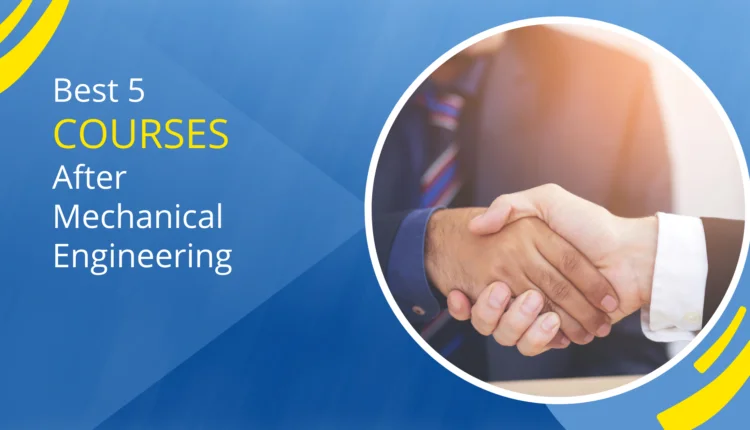Best Five Short- Term Courses for Mechanical Engineers

Mechanical engineering is a dynamic and challenging field that requires a strong foundation in both theoretical and practical skills. With technological advancements and industry innovations happening at an unprecedented pace, it is important for mechanical engineers to continuously seek out new knowledge and skills to stay ahead in their careers. Short-term courses offer a convenient and efficient way for engineers to expand their expertise in specific areas of the field. Whether you are interested in developing new skills or simply want to keep up with the latest advancements, there is a short-term course that is right for you. In this article, we will explore the five best short-term courses for mechanical engineers that will help you grow professionally and stay ahead in your career. These courses cover a wide range of topics, from piping engineering design and analysis to solar engineering and process equipment design, and are designed to meet the needs of engineers at all stages of their careers. So, whether you are just starting out or are a seasoned professional, these courses are the perfect way to expand your knowledge and skills in the dynamic and ever-evolving field of mechanical engineering.
Piping Engineering Design and Analysis Course:
Piping engineering course is a critical aspect of mechanical engineering, as it deals with the design, analysis, and maintenance of piping systems. This course will provide engineers with the knowledge and skills needed to effectively design, analyse and maintain piping systems. Topics covered in this course include fluid mechanics, piping materials, stress analysis, and piping system design.
In addition, the course covers pressure drop calculations, which are critical in determining the flow rate and pressure drop of a fluid through a piping system. Students will also learn about pipe stress analysis, which is used to determine the amount of stress a pipe can endure without failing. This knowledge is essential in ensuring the safety and reliability of a piping system.
Finally, the course covers pipeline design, which includes the selection of pipe size, routing, and supporting components such as valves, fittings, and flanges. Students will learn how to design pipelines that are both efficient and cost-effective, while also meeting the specific requirements of the project.
Overall, the Piping Engineering Design and Analysis course is essential for engineers who want to specialize in the design and analysis of piping systems. The course provides a comprehensive overview of the fundamental principles and practices of piping engineering, and prepares students for careers in the field. Whether you’re just starting your career or looking to expand your knowledge, this course is a valuable investment in your professional development.
This course is designed for engineers who want to specialize in the design and analysis of ships and offshore structures. Topics covered include ship design, stability and seaworthiness, materials and coatings, and structural analysis. Engineers will also learn about the latest technologies used in the maritime industry. Including computer-aided design (CAD) and finite element analysis (FEA).
Drilling and Production Technology Course:
This course covers the latest techniques and technologies used in the drilling and production of oil and gas. Topics covered include drilling operations, well completion, and production engineering. Engineers will learn about drilling fluids, well control, and the design and operation of production facilities. This course is essential for engineers who want to specialise in the upstream oil and gas industry.
Certification Course in Solar Engineering PV:
Solar energy is a rapidly growing industry, and engineers with expertise in this field are in high demand. This certification course covers the design and installation of photovoltaic (PV) systems, including system sizing, component selection, and electrical design. Engineers will also learn about the economics of solar energy and the regulatory environment surrounding the industry.
Process Equipment (Static / Rotary) Design and Analysis Course:
This course covers the design and analysis of static and rotary process equipment, including tanks, heat exchangers, and centrifuges. Engineers will learn about the latest technologies used in the design and analysis of process equipment. Including computer-aided design (CAD) and finite element analysis (FEA). Topics covered in this course include materials selection, stress analysis, and equipment optimization.
conclusion
The five short-term courses for mechanical engineers discussed in this article provide a valuable opportunity. For engineers to expand their knowledge and skills in specific areas of the field. From piping engineering design and analysis . Solar engineering and process equipment design, these courses are designed to meet the needs of engineers. At all stages of their careers. By taking these courses, engineers can stay up-to-date with the latest advancements in their field. And remain competitive in a rapidly changing job market. Whether you are just starting your career or are a seasoned professional. These courses are an investment in your future, and will help you to grow professionally and achieve your goals. So, if you are looking to take your mechanical engineering career to the next level. Consider enrolling in one of these five short-term courses. With the right training and education, you can be well on your way to a successful. Afulfilling career in mechanical engineering.





